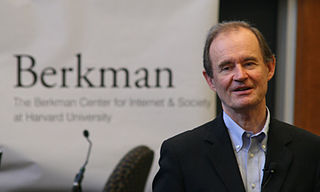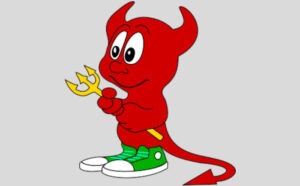Folks who follow news about FOSS, OSS and Linux who also watch the “talking heads” shows the TV networks serve up on Sunday mornings might be excused for not noting that David Boies, the lawyer speaking for Sony on this week’s “Meet the Press,” has on several occasions been involved in news stories affecting Linux. Over the years, he’s played the role of both friend and foe, but it’s been a while since his and the FOSS world’s paths have crossed.

Photograph by Doc Searls
Boies, along with three attorneys representing the States, brought Microsoft to it’s knees — or so it seemed at the time.
On November 5, 1999, Judge Thomas Penfield Jackson found that Windows dominance on the PC made the company a monopoly and that the company had taken illegal actions against Apple, Java, Netscape, Lotus Notes, RealNetworks, Linux, and others in order to maintain that monopoly. He ordered Microsoft broken in two, with one company producing Windows and another handling all other Microsoft software.
As we all know, Judge Jackson’s solution was never implemented.
Although an appeals court upheld the verdict against Redmond, the breakup of the company was overturned and sent back to the lower court for a review by a new judge. Two years later, in September, 2001, under the Bush Administration, the DOJ announced that it was no longer seeking the breakup of Microsoft, and in November reached a settlement which California, Connecticut, Iowa, Florida, Kansas, Minnesota, Utah, Virginia and Massachusetts opposed.
The settlement basically required Microsoft to share its APIs and appoint a three person panel that would have complete access to Microsoft’s systems, records, and source code for five years. The settlement didn’t require Microsoft to change any code or stop the company from tying additional software with Windows. Additionally, the DOJ did not require Microsoft to change any of its code.
During the appeals process on the Microsoft case, Boies picked up some more cred with some but by no means all free tech supporters when he represented Napster, at the time an extremely popular music focused filesharing site, when it was successfully sued under the DMCA by the RIAA in 2000. Napster lost that case and the subsequent appeal. It ended up going offline in 2001 and filed for bankruptcy in 2002.
After that, Boies soon found himself on the other side of the Linux and FOSS fence when he was retained by SCO, a company which had begun life as the developer and marketer of Caldera, a Linux distribution, but which had morphed into SCO after it signed a deal with Novell to distribute Unix. Boies was hired to represent the company in at least five separate lawsuits in which SCO was the plaintiff claiming copyright infringement of Unix.
This legal frenzy was centered around a $1 billion suit, later raised to $3 billion, filed in 2003 against IBM. Here, SCO claimed that Big Blue had shared Unix code copyrighted by SCO with Linux. Needless to say, this caused quite a stir in the FOSS community, which saw this as a direct attack on both Linux and the GPL. For four or five years, this made SCO the most hated company on the planet by FOSS supporters, even more so than Microsoft.
It also led to the creation of Groklaw, a now defunct website which explained in everyday language the ongoing legal battles between SCO and those targeted by its attacks. Later, Groklaw would move on to explain other legal challenges to FOSS projects, especially those involving Linux.
In the end, SCO’s legal cases were pretty much rendered null and void when in 2007 Judge Dale Kimball ruled in a suit between SCO and Novell that “…the court concludes that Novell is the owner of the UNIX and UnixWare copyrights.” SCO had no case. Even if it’s claims had merit, which they didn’t, it didn’t own Unix and so had no standing to sue.
Now David Boies represents Sony as its chief counsel. On Sunday’s “Meet the Press” he mildly took Obama to task for saying that Sony had “made a mistake” when it pulled “The Interview” from wide release, saying, “I would have liked to have seen it without the blame the victim aspect of it.”
So what does that have to do with the cost of tea in China? Truthfully, not very much. But when I saw his name come up connected with the Sony hack, I was reminded of the times he’d been part of events that had been important to FOSS supporters. At the same time, it occurred to me that there are many newcomers to FOSS who probably aren’t aware of the rich history that got us to where we are today.
Christine Hall has been a journalist since 1971. In 2001, she began writing a weekly consumer computer column and started covering Linux and FOSS in 2002 after making the switch to GNU/Linux. Follow her on Twitter: @BrideOfLinux










